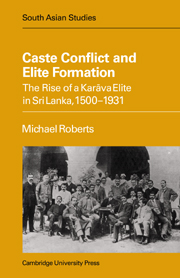Book contents
- Frontmatter
- Contents
- List of figures, chart and maps
- List of tables
- Preface
- Glossary
- List of abbreviations
- Map 1 The Kingdoms of Kotte and Kandy
- Map 2 Some physical features and place names
- Map 3 Present administrative divisions and the contemporary migration patterns of fishermen
- Map 4 The coastal waters of Sri Lanka and southeastern India
- 1 Introduction
- 2 The Karāva in the past
- 3 Caste among the Sinhalese
- 4 Economic opportunities and social relations, 1500s–1790s
- 5 The British period: the economic advances of a Karāva elite
- 6 Social competition, caste conflict and manifestations of Karāva power
- 7 Casteism in South Asian politics during British times: emergent cultural typifications or elite fictions?
- 8 Causal factors in the moulding of Karāva entrepreneurship and the emergence of a Karāva elite
- 9 Concluding remarks
- Tables
- Appendix 1 Problems and cautionary notes concerning the information derived from the plantation directories in the sequential series known as Ferguson's Ceylon Directory
- Appendix 2 A contemporary newspaper account of the reception provided for a Karāva notable on his receiving the title of ‘Mudaliyar of the Governor's Gate’ in 1853
- Appendix 3 A list of caste pamphlets and caste literature in chronological order, 1864–1930
- Select bibliography
- Index
Appendix 2 - A contemporary newspaper account of the reception provided for a Karāva notable on his receiving the title of ‘Mudaliyar of the Governor's Gate’ in 1853
Published online by Cambridge University Press: 30 October 2009
- Frontmatter
- Contents
- List of figures, chart and maps
- List of tables
- Preface
- Glossary
- List of abbreviations
- Map 1 The Kingdoms of Kotte and Kandy
- Map 2 Some physical features and place names
- Map 3 Present administrative divisions and the contemporary migration patterns of fishermen
- Map 4 The coastal waters of Sri Lanka and southeastern India
- 1 Introduction
- 2 The Karāva in the past
- 3 Caste among the Sinhalese
- 4 Economic opportunities and social relations, 1500s–1790s
- 5 The British period: the economic advances of a Karāva elite
- 6 Social competition, caste conflict and manifestations of Karāva power
- 7 Casteism in South Asian politics during British times: emergent cultural typifications or elite fictions?
- 8 Causal factors in the moulding of Karāva entrepreneurship and the emergence of a Karāva elite
- 9 Concluding remarks
- Tables
- Appendix 1 Problems and cautionary notes concerning the information derived from the plantation directories in the sequential series known as Ferguson's Ceylon Directory
- Appendix 2 A contemporary newspaper account of the reception provided for a Karāva notable on his receiving the title of ‘Mudaliyar of the Governor's Gate’ in 1853
- Appendix 3 A list of caste pamphlets and caste literature in chronological order, 1864–1930
- Select bibliography
- Index
Summary
The procession from Colombo and welcome at Moratuwa of Jeronis de Soysa, Esq., after his appointment to the rank of Mudaliyar of the Governor's Gate
Note from the Editor of the Colombo Observer
Below we give a graphic and interesting account of the reception accorded at Colombo to the man whom, on account of his public spirit, Sir George Anderson has delighted to honour. The matter is more important than would appear at first sight to our English readers. The dignity conferred on Mr. De Soysa is one that has hitherto been jealously confined to the small knot of obstructives amongst the Sinhalese who call themselves first class Velales; and on this occasion the Maha Modliar, we believe, did his little best to prevent the Government from shocking the prejudices of the people – meaning by that phrase a little knot of Modliars – by conferring the highest Native rank in its gift on a man of the fisher caste. All honour to Sir George Anderson for the personal courage and decision displayed by him on this occasion. The British Government is not only too generous, but also too strong, to allow its own benevolent intentions, and the wheels of progress to be any longer impeded by foolish fears of offending antiquated caste prejudices.
The newly created Modliar is a Native Coffee Planter on a large scale; very enterprising and very wealthy. But his claims to the dignity conferred on him rest on the erection by him, at his own cost, of public works, such as Ambalamas and Bridges, the formation of roads, etc.
- Type
- Chapter
- Information
- Caste Conflict Elite Formation , pp. 331 - 335Publisher: Cambridge University PressPrint publication year: 1982



